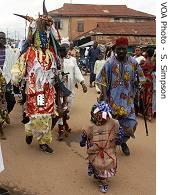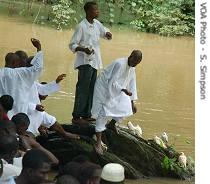2007年VOA标准英语-Traditional Religion is Alive and Well Among Ni(在线收听)
Oshogbo, Nigeria
02 September 2007
The dominant religions in Nigeria are Islam and Christianity, imported to West Africa generations ago. But traditional African religion has not been forgotten, especially among the Yoruba ethnic group. Many tens of thousands of Yoruba gathered in the southwestern city of Oshogbo for the annual Osun festival this week, to offer sacrifices and prayer for Osun, the river goddess. Sarah Simpson reports from Oshogbo on how traditional religion co-exists with Islam and Christianity in Nigeria.
Crowds start gathering shortly after dawn. Drumming and trumpeting accompany the worshipers through the streets of Oshogbo and into the cool shade of the Oshogbo Sacred Forest. There they head to the riverbank where sacrifices and prayers are made to Osun, the river goddess. Cow bells rattle up more prayers.

Devotees give sacrifices of birds, food and money to Osun, the river god, in Nigeria, 31 Aug 2007
Some worshipers, like Omolola Adebisi, have traveled many miles to take part in the once a year festivities.
"This festival is very important to Yoruba, because of the Yoruba culture. From our forefathers it has been going, right from then up to today. So it is very important to all Yoruba land," said Adebisi.
The Yoruba believe that Osun, the river goddess, has the power to grant wishes.
|
|
| Children join masquerade in Oshogbo, Nigeria, 31 Aug 2007 |
"It is believed that in traditional Nigerian religion, when you want to worship all the gods and goddesses you do not do that empty handed," said Onuoha.
At the waters' edge, face dripping with river water, Sewa Akinsanya explains why the festival is particularly important for women.
"It is not as if I am barren. But I am disturbed a little bit. I have two kids already, but for a good nine years I just need a baby," said Akinsanya. "So I came here to seek the Osun festival to give me another one [baby]."
Akinsanya is a Christian, but sees no problem asking Osun for help to conceive. Also at the festival is Ibrahim Musa. He goes to mosque through the week, but calls on Osun for favors once each year.
"I am a Muslim so I go to Mosque and pray to God. But Osun is once in a year," said Akinsanya. "You ask and you shall be given!"
They, like Yekeens Araoye, see no difference between Yoruba traditional beliefs, Islam and Christianity - saying each is about worship of a supreme god.
"Oludumari, Allah or Jesus or the Lord in the Christian version - it is still the same supreme being that you are talking about," added Araoye.
 |
| Drummers accompany worshipers through the Sacred Forest, Nigeria, 31 Aug 2007 |
"This water, we believe that if we use it for any of our problems it will cure [them]. That is why many people are taking the water."
The music and dancing continues into the night as worship gives way to revelry. The Yoruba are one of the largest ethnic groups in Nigeria, about one fifth of the country's 135 million people.
